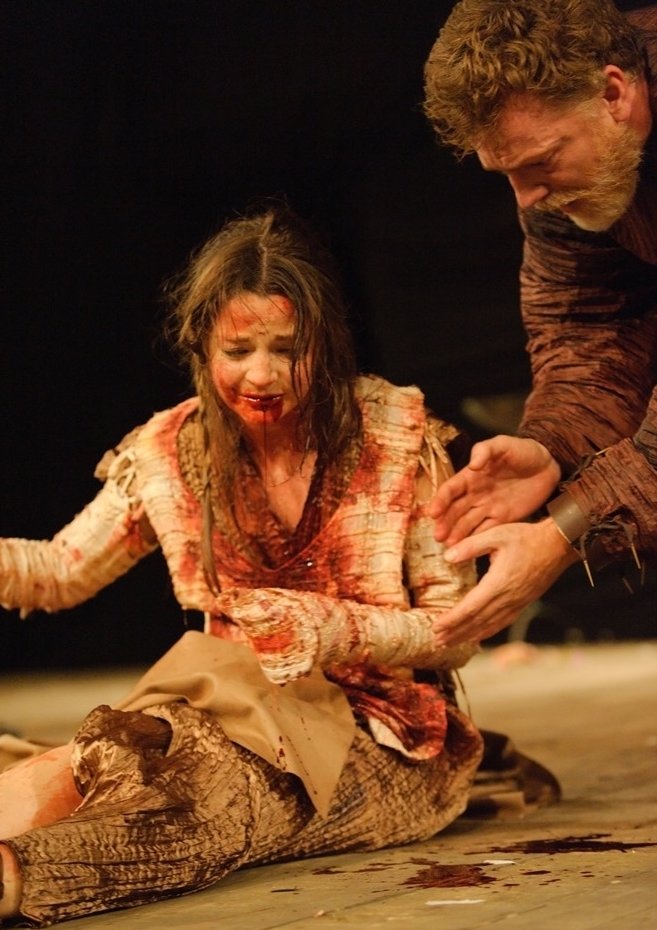Lucy Bailey’s Titus Andronicus doesn’t pull any punches (or stabbings, smotherings and throat-slittings, for that matter). Bursting into a Globe smoky with incense, with shouts and drums, forcing itself at us and on us, this is a production whose physicality is its true language. But while anyone going for the gore will get their money’s worth – the opening night added a few more to the tally of fainting audience members – they’ll also get something better: a show that’s shocking, certainly, but whose provocations are never empty.
Much is made of Titus as an early play. Criticism has traditionally stressed its flaws over its achievements, comparing it to tragedy-of-words Hamlet and finding its dramatic rough-and-tumble wanting. But then, it was always intended to be. In Titus Andronicus the currency of violence is debased so far that cannibalism becomes a punchline. Faced with such mounting horror and hopelessness we look away, or laugh, or faint – anything to avoid having to confront it.
Originally staged in 2006, Bailey’s production is revived with as much energy and intelligence as ever. Much of its success comes from crowd-control, dominating the Globe’s space and forcing us all into violent complicity. We are the mob that drag the jovial Bacchus to his death, the crowd who approve Saturninus as emperor, the horrified spectators at Titus’s twisted feast.
This is a tragic hero witnessed after, rather than before, his tragedy
William Dudley’s designs swathe the stage, Christo-like, in black fabric. By now we all know what to expect from a Globe show, but here carved detail and decoration give way to a void, and even the sky is darkened by black cloths. Persistent incense-burning shrouds some of the brutal excesses in smoke, creating an uneasy stench of ritual among so much lawlessness. Even Django Bates’s music doesn’t obey the rules, offering up quasi-traditional textures – drums, squealing natural trumpets – but then leading us harmonically into unfamiliar territory.
 At the centre of the blood and confusion is William Houston’s Titus (pictured right with Flora Spencer-Longhurst's Lavinia). Damaged from the start, returning from battle with yet more dead sons and casually stabbing another almost as soon as the action gets underway, this is a tragic hero witnessed after, rather than before, his tragedy. Houston’s early hints of trauma give way to a delicate madness that’s disturbing precisely for its rationality. Undeceived by Tamora’s masque, he manipulates it carefully to his own ends, outdoing his enemy’s barbarity in the process.
At the centre of the blood and confusion is William Houston’s Titus (pictured right with Flora Spencer-Longhurst's Lavinia). Damaged from the start, returning from battle with yet more dead sons and casually stabbing another almost as soon as the action gets underway, this is a tragic hero witnessed after, rather than before, his tragedy. Houston’s early hints of trauma give way to a delicate madness that’s disturbing precisely for its rationality. Undeceived by Tamora’s masque, he manipulates it carefully to his own ends, outdoing his enemy’s barbarity in the process.
Indira Varma’s Tamora plays it cool, wearily sardonic rather than ferocious, an approach matched by Obi Abili’s Aaron. If Shakespeare asks us to define what is civilised here, then Bailey isn’t offering us any help in deciding. If there’s any weakness however it’s a too-quick retreat to humour, and these drily self-aware villains only enable this. Matthew Needham’s Saturninus, by contrast, is a welcome release – violently uncontained, and childishly instinctive in all responses.
It wouldn’t be Titus without the mutilation of Lavinia. Bailey ensures that there’s nowhere to look but at Flora Spencer-Longhurst’s twitching stumps and bloodied mouth, enforcing silence for long enough to give these wounds their chance to speak before Marcus (Ian Gelder) leaps in to paraphrase. Not the buffoon he sometimes can be, Gelder finds some small dignity in the impotence of the role.
Framed in the polite proscenium of a West End theatre, the cracks in Shakespeare’s youthful tragedy might jar. Played out at arm’s length its violence might seem distasteful, its hopelessness alienating. But bound as it is in the strange complicity of the Globe, spattered with gore and pickled in incense, I defy any audience to resist the brutal potency of this confronting and unsettling play. “Have we done aught amiss?” asks Marcus. It’s a question that lingers in the ears on the walk home.















Add comment